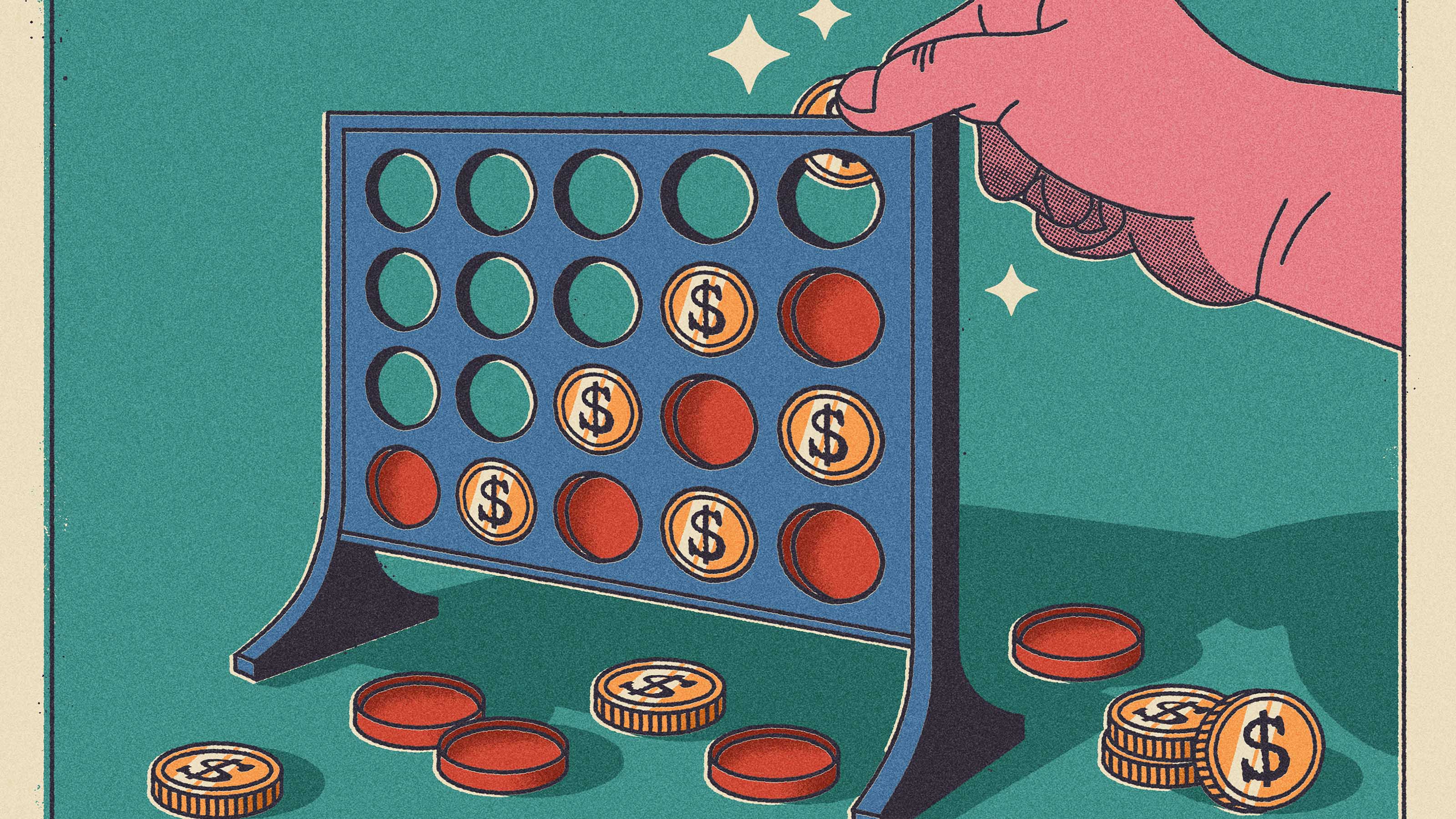How Losing Stocks Are Like Ex-Spouses
It took me 16 years to leave my ex. But I wanted to get divorced from my hurtful investments more quickly, so I called a couple of financial therapists.

Profit and prosper with the best of Kiplinger's advice on investing, taxes, retirement, personal finance and much more. Delivered daily. Enter your email in the box and click Sign Me Up.
You are now subscribed
Your newsletter sign-up was successful
Want to add more newsletters?

Delivered daily
Kiplinger Today
Profit and prosper with the best of Kiplinger's advice on investing, taxes, retirement, personal finance and much more delivered daily. Smart money moves start here.

Sent five days a week
Kiplinger A Step Ahead
Get practical help to make better financial decisions in your everyday life, from spending to savings on top deals.

Delivered daily
Kiplinger Closing Bell
Get today's biggest financial and investing headlines delivered to your inbox every day the U.S. stock market is open.

Sent twice a week
Kiplinger Adviser Intel
Financial pros across the country share best practices and fresh tactics to preserve and grow your wealth.

Delivered weekly
Kiplinger Tax Tips
Trim your federal and state tax bills with practical tax-planning and tax-cutting strategies.

Sent twice a week
Kiplinger Retirement Tips
Your twice-a-week guide to planning and enjoying a financially secure and richly rewarding retirement

Sent bimonthly.
Kiplinger Adviser Angle
Insights for advisers, wealth managers and other financial professionals.

Sent twice a week
Kiplinger Investing Weekly
Your twice-a-week roundup of promising stocks, funds, companies and industries you should consider, ones you should avoid, and why.

Sent weekly for six weeks
Kiplinger Invest for Retirement
Your step-by-step six-part series on how to invest for retirement, from devising a successful strategy to exactly which investments to choose.
One of the top women on Wall Street recently told me that females tend to “marry” their investments. The comment hit home. As I mentioned in my column last month, I have a strong aversion to selling stocks, and that, I now realize, is a flaw that has hurt the performance of my Practical Investing portfolio.
The problem has been particularly acute over the past year, as I watched a number of my stocks slide steadily and I reacted by doing nothing. Well, not exactly nothing. What I did was make excuses for the companies, much as I used to excuse the behavior of my former husband: “It’s restructuring.” “The whole industry is in a slump.” “Currency swings.” “China.”
It took me 16 years, including a few in therapy, to finally leave my ex. But I wanted to get divorced from my hurtful investments more quickly, so I called a couple of financial therapists.
From just $107.88 $24.99 for Kiplinger Personal Finance
Become a smarter, better informed investor. Subscribe from just $107.88 $24.99, plus get up to 4 Special Issues

Sign up for Kiplinger’s Free Newsletters
Profit and prosper with the best of expert advice on investing, taxes, retirement, personal finance and more - straight to your e-mail.
Profit and prosper with the best of expert advice - straight to your e-mail.
Brad Klontz, who is cofounder of the Financial Psychology Institute and who is also divorced, immediately understood the analogy. “You think that if you just hold on long enough, things will change,” Klontz told me. “This hope distorts your vision of reality. To sell—to walk away—means you are making your mistake real. It hurts. You suffer through all kinds of regret. No one wants to feel that, so you kick the can down the road, hoping that it will get better.”
J. Jeffrey Lambert, a certified financial planner and a member of the Financial Therapy Association, told me that selling becomes easier if you understand the goal of each of your holdings. You need to ask yourself, What do you want your investments to do for you? Lambert says.
It’s a great question, and it reminds me of what I said when I launched my portfolio four years ago. I was seeking a low-maintenance relationship—one that comported with my preference to buy stocks and hold them for a long time, preferably forever. To accomplish this goal, I would invest in companies capable of weathering difficult economic environments, with fortress-like balance sheets, consistent earnings growth and seasoned executives.
Several of my portfolio’s problem stocks never fit the bill. Why did I buy these bad boys in the first place? “Whenever I’ve made a mistake like that, it was all about feeling as if I’d otherwise miss out on something,” Klontz said. “They’re exciting. There’s an element of intrigue. At the same time, you know that you’re not usually attracted to that kind of investment.”
Having completed my therapy, I signed on to my brokerage account with a plan to eject my miscreants. Naturally, most were behaving well that day. But I’d seen that routine before. I decided to make a clean break. Walk away. Don’t look back. (I’ll save for another day how I deal with big winners that come to strain my value parameters.)
Saying goodbye. Acacia Research (symbol ACTG), you’ve never delivered consistent results. You say you’re on the cusp of turning the corner with an improved portfolio of patents that you are hired to protect, but you just can’t control the timing of the court decisions that bring in your revenues. You’re not my kind of company. Stone Energy (SGY), I thought you had promise, but your cash flow has gone from subpar to miserable. I’m out. And Nu Skin Enterprises (NUS), you rely on housewives here and in the developing world to buy your skin-care and weight-loss products to sell to their friends. I know many people will buy your pills and serums. But me, I advocate diet and exercise. We’re just too different to ever make this relationship work.
It was a painful day, as I locked in total losses of $21,982. I consoled myself with the knowledge that those losses will help lower my 2015 tax bill. And, glass of wine in hand, I offered a toast to better choices with my next batch of stock picks.
Profit and prosper with the best of Kiplinger's advice on investing, taxes, retirement, personal finance and much more. Delivered daily. Enter your email in the box and click Sign Me Up.

-
 Over 65? Here's What the New $6K 'Senior Deduction' Means for Medicare IRMAA Costs
Over 65? Here's What the New $6K 'Senior Deduction' Means for Medicare IRMAA CostsTax Breaks A new deduction for people over age 65 has some thinking about Medicare premiums and MAGI strategy.
-
 U.S. Congress to End Emergency Tax Bill Over $6,000 Senior Deduction and Tip, Overtime Tax Breaks in D.C.
U.S. Congress to End Emergency Tax Bill Over $6,000 Senior Deduction and Tip, Overtime Tax Breaks in D.C.Tax Law Here's how taxpayers can amend their already-filed income tax returns amid a potentially looming legal battle on Capitol Hill.
-
 5 Investing Rules You Can Steal From Millennials
5 Investing Rules You Can Steal From MillennialsMillennials are reshaping the investing landscape. See how the tech-savvy generation is approaching capital markets – and the strategies you can take from them.
-
 The Most Tax-Friendly States for Investing in 2025 (Hint: There Are Two)
The Most Tax-Friendly States for Investing in 2025 (Hint: There Are Two)State Taxes Living in one of these places could lower your 2025 investment taxes — especially if you invest in real estate.
-
 The Final Countdown for Retirees with Investment Income
The Final Countdown for Retirees with Investment IncomeRetirement Tax Don’t assume Social Security withholding is enough. Some retirement income may require a quarterly estimated tax payment by the September 15 deadline.
-
 How to Beef Up Your Portfolio Against Inflation
How to Beef Up Your Portfolio Against Inflationinvesting These sectors are better positioned to benefit from rising prices.
-
 Taxable or Tax-Deferred Account: How to Pick
Taxable or Tax-Deferred Account: How to PickInvesting for Income Use our guide to decide which assets belong in a taxable account and which go into a tax-advantaged account.
-
 Smart Investing in a Bear Market
Smart Investing in a Bear Marketinvesting Here's how to make the most of today’s dicey market.
-
 How to Open a Stock Market Account
How to Open a Stock Market Accountinvesting Investing can be fun, but you need a brokerage account to do it. Fortunately, it’s easy to get started.
-
 The Right Dividend Stock Fund for You
The Right Dividend Stock Fund for YouBecoming an Investor Dividend stock strategies come in many different flavors. Here's what to look for.
-
 Alternative Investments for the Rest of Us
Alternative Investments for the Rest of UsFinancial Planning These portfolio diversifiers aren't just for the wealthy.